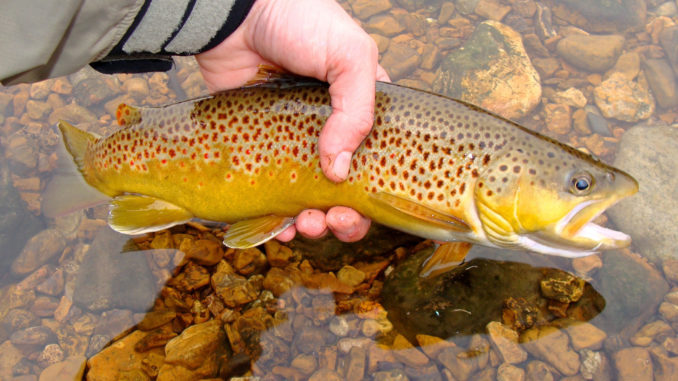
Great catches don’t measure a day’s value
We follow the stream where we can, fishing deep pools and smooth runs in water so clear we can see every detail of the streambed. Brightly colored leaves swirl in the eddies and gather in thick carpet like clumps in the deepest sections of water. On almost every cast, the lure snags a leaf or two, and when the current grabs the leaf and tugs, it feels, for a brief moment, like a hooked trout.
The trout are there; we can see them, their heads turned upstream in the current, tails moving ever so slightly to maintain position, waiting and watching. Time after time, we cast our flies above the trout, letting the flies float past their noses. Not even a twitch. We change to a small parachute Adams and a Royal Wulff, but they also are shunned.
At some point on a fishing trip, early or late, you realize you aren’t going to catch a fish, no matter what you use or how well you fish. When that realization sinks in, you don’t stop fishing, but you relax and enjoy your surroundings more. There are no bad fishing days. Some days are good, and some are better.
It is a typically beautiful fall day, cool, sunny and not a cloud in a pastel blue sky. We’re on Forney Creek in the Great Smoky Mountains National Park. Forney is known for its trout, maybe not as well-known as its famous sisters, Hazel and Eagle creeks, but it still has a dedicated following.
I’m fishing with two friends. Two days before, one of them fished the stream with dry flies and caught a dozen rainbow trout. Two days before was Saturday, and this is Monday. Things change.
We work upstream, giving each other wide berth, shaking our heads at the unasked but obvious question. No trout. But it is a beautiful day, and the sun soaks in on nearby ridges, bringing out the muted colors of yellow, gold and burgundy in breathtaking detail. Forney Creek Trail and the forest floor are covered with crunchy, new leaf fall.
I’m carrying a day pack with our lunch and drinking water. I stop for a drink on a steep bank above the stream, remove the camera hanging from my neck, unhitch the pack, lean it against a sapling, and place my camera on top of the pack. When I take the water bottle out of the pack, it flops over, and the camera tumbles down the bank.
I hold my breath, watching as the camera rolls toward the water 20 feet below, hoping a bush or root will snag the strap. The camera makes only a small splash when it hits the water, but it is a terribly loud splash. No point in cursing or gnashing my teeth or calling myself some deserved bad names, so I finish my drink, eat a snack, and retrieve my ruined camera from the water.
We fish until 4 p.m. and cover almost four miles of stream with nothing to show for our efforts but several undersized rainbows. An hour or so later, we’re heading back across Fontana Lake to the Alarka Creek marina. The sun is setting, and it’s a fine early evening. We slowly ride across the lake, enjoying the view and the evening.
Ahead of us, a large blue heron lifts off the water, and with slow, flapping wings, she rises high above the lake and perches at the top of a tall pine on the end of a point directly across from us. Behind her is the setting sun, and she is silhouetted in a perfect profile. My friend cuts the motor, and we watch until she flies away. It is a magical moment.
We are a couple of miles from the boat landing. My friend starts the engine and pulls the throttle back. The engine skips and dies. He looks startled, and when he restarts the engine, it sputters and dies.
“We’re out of gas,’’ he says and laughs.
We sit for a moment on the quiet lake. No one is in sight.
“I think we can make it the rest of way with the trolling motor,” he says, but the trolling motor drains the battery before we reach the landing. We sit dead in the water. It’s almost dark before we see a boat. My friend hails the boat, and we’re towed in.
“I’ve never run out of gas,’’ my friend says. ‘This is a first.’’
We haven’t caught any trout for dinner. I’ve ruined my camera. We’ve run out of gas in the middle of the biggest lake in the mountains. We should be frustrated, mad, something, but all we do is laugh about it. We have dinner in a restaurant and laugh some more.
The day could have been worse, but it couldn’t have been much better.

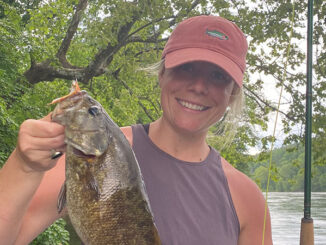
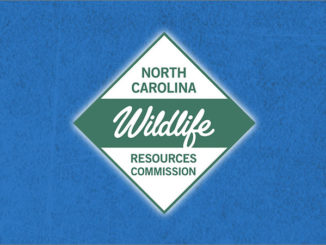
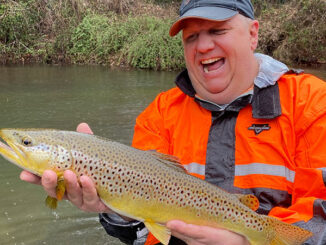
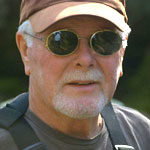
Be the first to comment